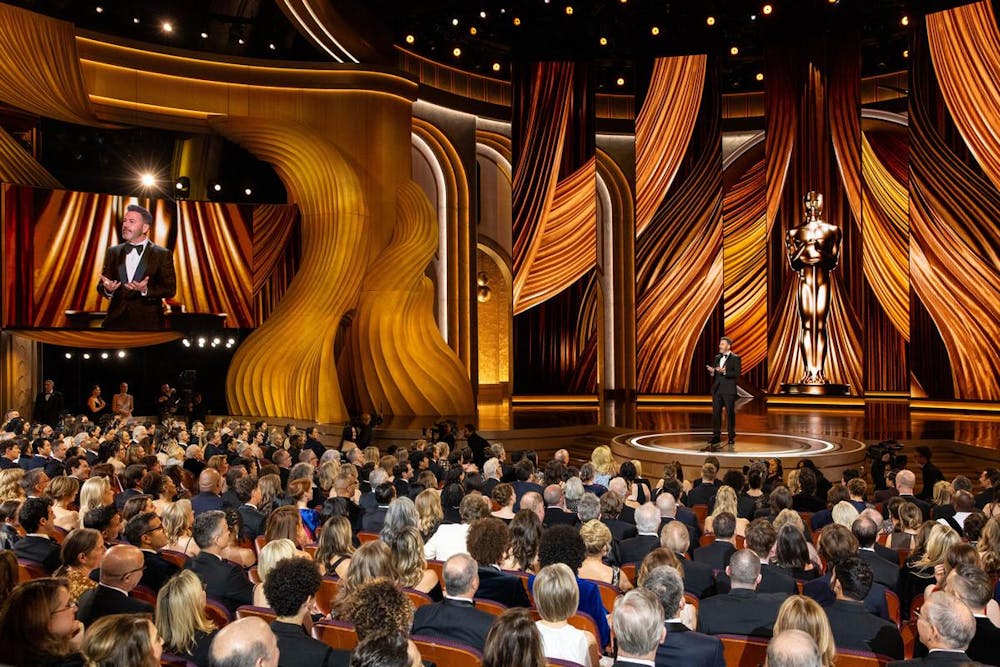Whether the purpose of the Academy Awards is to be a vibrant celebration of cinema or pure entertainment rooted in Hollywood glamor, Sunday’s ceremony fell flat in both respects.
It wasn’t that the telecast was necessarily bad, but it was incredibly boring — which is arguably worse.
“Oppenheimer” took home Best Picture as well as six other accolades including Best Actor (Cillian Murphy), Best Supporting Actor (Robert Downey Jr.), Best Director (Christopher Nolan) and Best Cinematography (Hoyte van Hoytema). Trailing in second, “Poor Things” won four awards.
While last year’s ceremony was not particularly entertaining either, at least it showcased monumental historic triumphs. “Everything Everywhere All at Once” broke barriers, ushering in refreshing change to the typical lack of diversity that marks the Academy’s history. The generally predictable results this year added to the mundanity of the viewing experience.
Emma Stone’s Best Actress win for “Poor Things” and Da’Vine Joy Randolph’s Best Supporting Actress win for “The Holdovers” allowed for two heartfelt speeches that highlighted what the Oscars should really be about: a love for movies and the process of creating them. Yet, Stone’s sweet remarks were coupled with Lily Gladstone’s upset loss. This is not to say Stone’s inventive, beautifully and wholly unique performance was undeserving — she earned the award. But Gladstone was predicted to be the first Native American woman to win an acting Oscar, a point hard to forget considering her own impactful and emotional performance in “Killers of the Flower Moon.”
This past summer was marked by the “Barbenheimer” frenzy, a phenomenon that brought many viewers flocking back to the theater and reignited the fading moviegoing experience. There was hope that such fervent energy would fuel this year’s awards ceremony, but the excitement of “Barbenheimer” was nowhere to be found in this year’s show.
“Barbie” walked away with only one award: Best Original Song for “What Was I Made For?” by Billie Eilish and FINNEAS, performed live at this year’s ceremony. It’s true, though, that “Barbie” should be credited for some of “Oppenheimer”’s success in the box office due to the two films’ concurrent release.
This cooperative coexistence was not reflected in the wins of the night nor the nominations — a fact that host Jimmy Kimmel pointed out at the beginning of the ceremony by acknowledging Greta Gerwig’s snub for Best Director and Margot Robbie’s snub for Best Actress. To some extent, the intense recognition of “Oppenheimer”’s commercial and critical success in comparison to the lack thereof for “Barbie” is precisely what “Barbie” set out to address.
The addition of personal praise given to each of the acting nominees by previous winners was deeply deserved and appreciated, considering each nominee’s contributions to cinema. And Jonathan Glazer’s call for a ceasefire in Gaza provided a moment of reflection as he accepted the Best International Feature Film award for “The Zone of Interest,” adding to the multitude of past winners who have used their speeches as opportunities to make a wider political appeal.
A few additional wins stood out. A funny, enjoyable and pop-culturally relevant “I’m Just Ken” performance, a hilarious Kate McKinnon and Steven Spielberg exchange and a naked John Cena presenting the award for Best Costume Design brought much-needed comedic relief to the ceremony.
But by the end of the show, audiences were left feeling neither empowered nor satisfied.
Without any particular excitement, appreciation or even drama, the relevancy of the Oscars still stands in question in a climate where the allure of the silver screen is waning and audiences crave authenticity alongside spectacle. The Awards feel increasingly superficial and formulaic, with more effort directed toward avoiding criticism than to drawing attention and appreciation.
The Academy Awards’ influence and relevance relies on audiences' interest to tune in. Now, having completed two shows without any noteworthy surprises, only time will tell if the Awards can preserve cultural pertinence.





